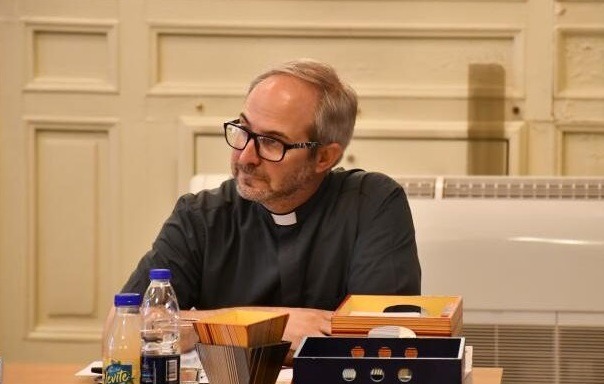After the presentation of the Summary of the first stage of the Synod to the Holy See, the sub-secretary of the CEA shared with AICA some of the conclusions and steps to follow.

Recently, the Argentine Episcopal Conference released the document that summarizes what was worked on in the first stage of the Synod in the country’s dioceses. This first stage, whose goal is the 2023 synod convened by the Pope, consisted of a path of listening “where all the Churches of the country became sounding boards to hear the cries and dreams of the people” and concluded with the delivery to the Holy See of this document, which includes the expressions that the People of God in Argentina manifested in this tour.
In that framework, AICA He spoke with the undersecretary of the Argentine Episcopal Conference, priest Matías Taricco, who shared some insights on the conclusions reached in this first synodal phase.
Regarding what the most salient conclusions were, the priest cited a list that appears in number 50: “Listening, dialogue and inclusion; overcome clericalism, be able to strengthen the leading role of women in the Church, revise the celebrations in search of a slightly more inculturated liturgy, promote the formation of new pastoral agents within the new paradigm that is synodality, work more closely with young people and forge a synodal spirituality”, he listed.
Asked about the needs, demands and even criticism that were reflected in this consultation process, Father Taricco pointed out: “We could say that the Church has expressed the need to work on a synodal spirituality that promotes listening, dialogue and inclusion. , in a strong criticism of clericalism, this reality that sometimes marks the life of the Church, from the perspective exclusively of the priests”, he explained, while warning that many times “that perspective is not only held by the pastors of the Church, but is incorporated in the laity themselves”
Regarding the effects of the pandemic that could be glimpsed in this process, the undersecretary of the CEA stated that “in general, the pandemic affected us all: the life of the Church, the different communities, the loss of loved ones, the loss of the face-to-face encounter, and this has often led to living the faith in a more individualistic way, or sometimes to the fear of encountering the other”.
However, he considered that “it has not been evidenced so much in the synthesis, as in the difficulties to carry out the synodal process.” There, he affirmed, “is where many dioceses point out the main difficulty that the pandemic has left in terms of the synodal process, in terms of the life of the communities. As for the synodal process, due to the pandemic, it has taken a long time to come to fruition, to reach the final document that was offered in each diocese.
Participation in this stage “has been very good,” acknowledged the priest. “If we remember that the Church in Argentina has 71 dioceses and ecclesiastical circumscriptions, of which five are of the Eastern rite, and we take into account that there are 66 who have responded positively to the request of the synod, we would say that almost 90% of the diocese has mobilized, has participated”.
In that sense, he added: “What is verified is a great participation of the people of God, but, this must be qualified, it is not the same in all the regions, in all the provinces. We could say that there are dioceses that have already been carrying out a synodal process, therefore this request from the Secretariat of the Synod has strengthened the path they had been taking. Others are starting it; others had already closed their synodal stage, so the maturity or search of the Argentine Church, in such a diverse and large reality, necessarily goes through different stages, according to the experiences that each of the dioceses has”.
The great challenge to continue, he considered, “is to take charge of this document.” And he detailed: “This document, in ten brief pages, represents that, a very dense, very motley synthesis of the synodal experience of the Church in Argentina. We need to work on it, digest it, and when I say we need it, it is a double level: on the one hand, as pastors, the bishops would have to work on this document – in fact, the Episcopate is working on it – and it would also have to go back to the communities, so that the communities take ownership of the document again, chew it up again, see themselves reflected in it and, based on the perspective provided by the synthesis, be able to locate themselves on the national map to continue walking, to continue responding to the needs that the Church is discerning, and they are reflected in the document”.
“I think the journey in the local Church is very interesting. If we think about how the path continues in the stages of the Synod, now comes the continental stage, which does not mean annulling this stage, but tuning this stage with what is happening in the rest of Latin America and the Caribbean, to later do it in the Church universal, but I insist: one stage does not cover the other, that is, the Church in Argentina has to continue appropriating this voice of the people of God, to continue enriching its journey.”+
Synod: The Church must continue to enrich its journey with the voice of the People of God – AICA.org

